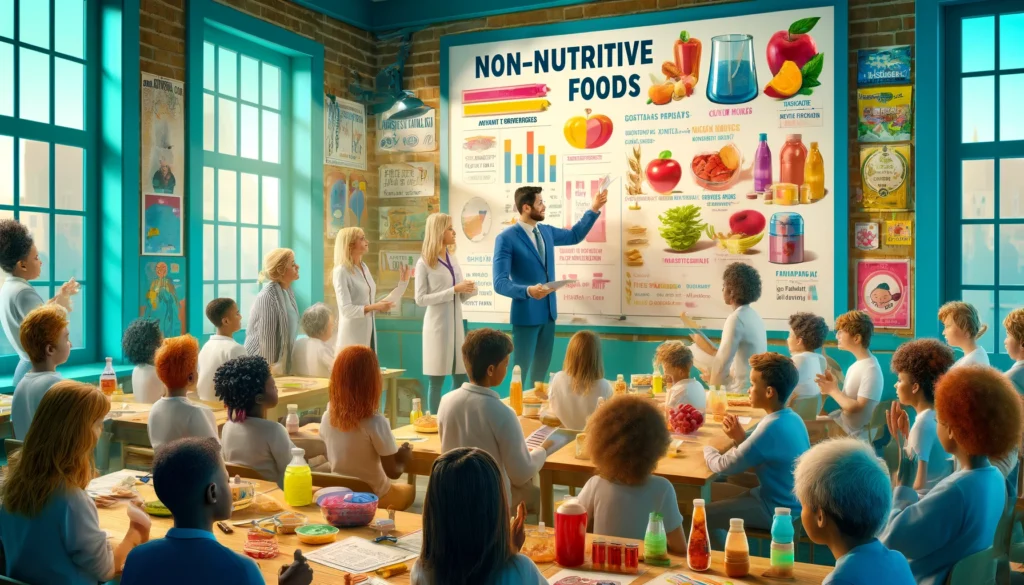Imagine sitting down to a meal that doesn’t weigh down your stomach or your conscience. In a world obsessed with superfoods and power meals, there’s a quiet revolution simmering in the pots of minimalists: non-nutritive foods. These culinary underdogs don’t pack the punch of vitamins or minerals, but they bring other, less tangible benefits to the table. Let’s explore the philosophical and pragmatic virtues of munching on foods that are, essentially, nutritional ninjas – present, but undetected.

- 10 Benefits of Non-Nutritive Foods
- Calorie Control
- Sensory Satisfaction
- Hydration Helper
- Digestive Ease
- Low Allergenic Risk
- Novelty and Fun
- Economic Choices
- Portion Control
- Mental Health Breaks
- Customizable Dieting
- 10 Facts About Non-Nutritive Foods
- Summary: Embracing the Lightness of Being
- FAQ (Frequently Asked Questions About Non-Nutritive Foods)
- Why are non-nutritive components important for our body?
- Why do we need non-nutrients?
- What are examples of non-nutrients?
- What happens if you don’t eat nutrients?
10 Benefits of Non-Nutritive Foods
Calorie Control
Non-nutritive foods like certain jellies, aerated drinks, and fiber supplements add bulk to your diet without piling on the calories. Ideal for those who wish to manage their weight without feeling deprived.
Sensory Satisfaction
Flavor isn’t always tied to nutrition. Many non-nutritive foods can satisfy cravings with minimal caloric intake. It’s like fooling your taste buds into thinking they’ve hit the jackpot, but your waistline knows better.
Hydration Helper
Foods like flavored water or gelatin desserts primarily contain water. Consuming them can help keep you hydrated, proving that not all hydration needs to come from plain old H2O.
Digestive Ease
While they may not provide nutrients, non-nutritive foods can help ease digestion. For instance, dietary fiber, though non-digestible, aids in maintaining bowel health and regularity.
Low Allergenic Risk
Many non-nutritive foods have a lower risk of triggering food allergies or intolerances, as they often lack substantial protein content, which is a common allergen in many foods.
Novelty and Fun
Let’s face it, eating jelly beans or sipping on a zero-calorie soda can be fun. In a diet full of serious nutrition, it’s okay to sprinkle a little fun into your meals.
Economic Choices
Non-nutritive foods tend to be cheaper than high-nutrient alternatives. This can be especially important in managing food budgets without sacrificing the volume of food consumed.
Portion Control
Using non-nutritive foods can help control portion sizes, as they allow people to feel fuller without overloading on calories or nutrients, which can be particularly useful during weight management.
Mental Health Breaks
Sometimes, the act of chewing or sipping without the heavy consequences of high-calorie or nutritionally dense foods can provide a mental break—a sort of culinary mindfulness.
Customizable Dieting
For those who require strict management of certain nutrients due to health conditions like kidney disease or diabetes, non-nutritive foods can add variety without adding risk.
10 Facts About Non-Nutritive Foods
- The concept of zero-calorie foods is more about minimal calorie intake than truly having zero calories.
- Non-nutritive doesn’t mean non-functional; many such foods serve purposes like hydration and satiety.
- Artificial sweeteners were discovered accidentally in the late 19th century.
- Some salad dressings are engineered to offer flavor with few to no calories.
- The first commercially available non-nutritive sweetener was saccharin.
- Non-nutritive foods are often used in food photography to enhance the appearance without affecting the food’s edibility.
- In sensory tests, non-nutritive foods are used to cleanse the palate between tasting nutrient-dense foods.
- The food industry uses non-nutritive fillers to enhance texture and stability of products.
- Chewing gum is a great example of a non-nutritive food that can aid in dental health by stimulating saliva production.
- Many jellies used in desserts gain their texture from agar-agar, which is mostly fiber.
Summary: Embracing the Lightness of Being
Non-nutritive foods might not fill up your nutrient quota, but they fill a niche that nutrient-dense foods can’t. Whether it’s adding fun to your diet, managing your weight, or just enjoying a guilt-free snack, these foods offer a different kind of dietary freedom. So next time you reach for that pack of sugar-free gum or a zero-calorie drink, remember: it’s not about what’s missing, it’s about what these choices add to your life—simplicity, control, and a bit of joy.
FAQ (Frequently Asked Questions About Non-Nutritive Foods)
Why are non-nutritive components important for our body?
Non-nutritive components, though not providing calories, are vital to our health. These include dietary fiber, antioxidants, and phytochemicals – substances that support everything from digestion to disease prevention. Think of them as the unsung heroes of the dietary world: they don’t fuel us with energy directly, but they keep the body’s systems running smoothly and protect against environmental damage.
Why do we need non-nutrients?
The importance of non-nutrients in our diet can’t be overstated. Here’s why:
- Dietary fiber promotes healthy digestion and aids in controlling blood sugar and cholesterol levels.
- Phytochemicals offer protection against chronic diseases by reducing inflammation and enhancing cellular health.
- Antioxidants fight oxidative stress, helping to prevent cellular damage that can lead to chronic health issues like cancer and heart disease. Incorporating a variety of these elements ensures that our bodies operate optimally, warding off disease and enhancing overall health.
What are examples of non-nutrients?
Here are some key non-nutrients that play significant roles in our health:
- Dietary Fiber: Found abundantly in beans, whole grains, and vegetables.
- Antioxidants: Such as vitamins C and E, found in colorful fruits and vegetables like oranges and spinach.
- Phytochemicals: Including flavonoids in berries and tea, and lycopene in tomatoes.
- Plant Sterols and Stanols: Commonly found in fortified foods and certain oils, which can help manage cholesterol. These components contribute to health maintenance and disease prevention, showcasing the power of a diverse diet.
What happens if you don’t eat nutrients?
Neglecting to consume essential nutrients can lead to a host of health problems, known collectively as malnutrition. This encompasses both deficiencies and excesses, leading to:
- Compromised immune function: Leaving the body more susceptible to infections.
- Deteriorating bone health: Increasing risk for conditions like osteoporosis.
- Cognitive impairments: Affecting concentration and memory.
- Energy deficits: Leading to chronic fatigue and impaired daily functioning. Adequate nutrient intake is critical not just for survival but for a vibrant, active life. Ensuring a balanced diet is essential to keep all systems in check and health at its peak.







